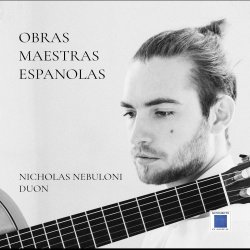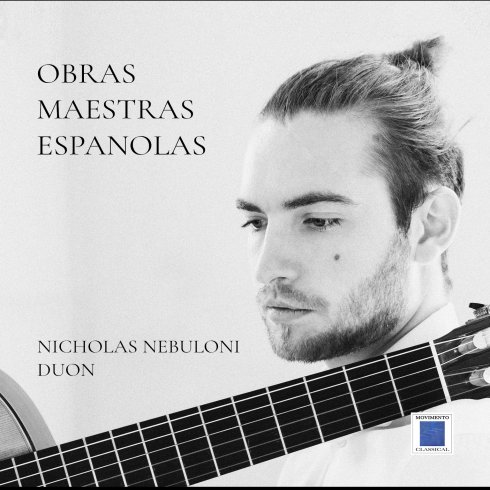

Obras Maestras Espanolas
OBRAS MAESTRAS ESPANOLAS
The indissoluble and historical link between Spain and the Guitar offers us, with this CD, a new and intense chapter: the "Spanish Masterpieces", as the evocative tille reminds us, follow one another in the interpretation of Nicholas Nebuloni combining great classics of the six-string repertoire to precious record news.
The CD opens with the unedited and evocative guitar version of Canci6n n. 6 by Federico Mompou (1893-1987), one of the most representative authors in the history of Catalan music.
Belonging to the cycle of "Canci6n y Danza" composed by the author between 1918 and 1972, it was originally intended lor the piano; Nebuloni deliberately gives us an intimate execution of the Canci6n alone, in the famous transcription made by the Venezuelan guitarist Alirio Diaz.
Mompou's short melody, slow and cadenced, acts as a dense and intense "opening theme· of the disc, full of warm instrumental colors enhanced by the guitar vibrato and deep tuning: as Mompou himself repeatedly reminds us of the the goal is to obtain "the maximum expressive farce with the maximum simplicity and economy of means, as well as a return to primitivism to present the bare and pure musical idea".
As the French musicologist Vladimir Jankélévitch suggests "The mystery of Mompou escapes us as soon as we try to label it or attribute it to some conceptual category. Yet we are able to perceive this sensitive, inimitable voice, the very voice of silence... The desire of Mompou in seeking this solitude in sound, is to reach the unattainable point where music becomes the very voice of silence, where silence itself becomes music".
Dionisio Aguado (1784-1849), famous guitarist-composer tram Madrid, is one of the greatest exponents of guitar
classicism, a very fortunate season that the instrument went through in the first thirty years of the 19th century. Alter studying with M. Garcia (Padre Basilio), Aguado perfected himself at the school of Federico Moretti and
subsequently embarked on a brilliant concert career: in Paris, where he settled from 1825 to 1838, he was a virtuoso appreciated by Paganini, Rossini, Bellini and Sor.
The qualification of "brilliant" suits him perfectly: it is no coincidence that the Trois Rondos brillants pour guitare seule Op. 2, represent the culmination of Aguado's compositional art.
The famous Ronda n. 2 present in this recording is characterized by Apollonian freshness and adamantine cantabilità, and is preceded by an inspired lntroduction: the execution of the numerous skill passages and cadenzas requires a sparkling technique and supreme instrumental contrai, flanked by the necessary expressive skills required by the more lyrical passages.
Creator of a new vision of the guitar language, the Catalan composer and guitarist Miguel Llobet (1878-1938) intuits and values one of the peculiar characteristics of his instrument: the sound!
As Angelo Gilardino, Llobet suggests, "he created in the specification of his new guitar language an arcane subli mation of the popular melodies of his homeland, Catalonia, anticipating the operation that, in the piano field, Federico Mompou would later carry out".
Examples are the cycle of variations entitled Variaciones sobre un tema de Sor, op. 15 in which Llobet combines timbre research with the exaltation of instrumental virtuosity: composed in 1908, the author adopts the theme of Folly and the first two variations written just under a century earlier by the illustrious countryman Fernando Sor, adding eight other variations and an Intermezzo. Demonstration of technical prowess and ingenuity of writing, Llobet enhances the technical-expressive possibilities of the guitar without incurring the risk of acrobaticism as an end in itself and subjecting virtuosity to a noble and artistic musical thought.
Rediscovered by the indefatigable Angelo Gilardino at the end of the 1980s, the Sonata para Guitarra by the Cas tilian composer Antonio José (Martinez Palacios) is probably the Spanish historical twentieth-century work that has become the most famous in the last twenty years.
The composer born in 1902 and barbarously murdered by Franco's supporters in the Spanish Civil War in 1936, reveals himself in the Sonata (the only composition dedicateci to the guitar) as a prosecutor of the Ravelian and Debussian style, writing a powerful and broad composition inspired by European modernism, avoiding references to " spanishisms" and academicism. In the Sonata para Guitarra (in tour movements) we find above ali Rave!: as Angelo Gilardino reminds us "the Ravelian sign is very clear, in the refined irony and in the consummate tendresse of the Minueto, and in an almost mimetic way, in the lyrical pathos of the Pavana Triste. The first movement is an evaded sonata form, in which the so-called development is replaced by a series of rarefied evocations of the main theme, and the Finale is a crackling Rondo in which the Rasgueado is used, not to evoke the Cante Jondo and its heroes, bui to arouse flames of Schumann-like energy".
The CD closes with the recordings, probably lor the first time in complete form, by the DuOn (Nicholas Nebuloni and Vanessa Bernardi) of the Seis Duos lor two guitars by the Zamora composer Fernando Ferandiere
(1740-1816). A violinist by training, he is the author of numerous pieces of music also intended lor the guitar (unfortunately many that have not survived) and of a text of significant importance, the Arte de tocar la guitarra espafiola, dateci 1799. Coming from a manuscript dating back to around 1800 when Ferandiere was working in Madrid, the Seis Duos (ali in two movements) offer usa concertante writing full of elegant vitality and originality of the instrumental treatment: it is evident a writing that combines late Baroque stylistic features with now classic compositional attitudes , creating a wisely dosed formai balance and an impressive wealth of strongly characterized melodie cues with refined, and often sudden, modulations.
Applause goes to this recording and to the performers lor the important work of disseminating a repertoire that reserves us scores of important artistic quality and sheds significant light on a season in the history of the guitar, the end of the eighteenth century, still little investigateci.


Nicholas Nebuloni
Nicholas Nebuloni graduated in bachelor with 110, Honors and Special Mention at the conservatory “A. Buzzolla” in Adria with M° Marco Bonfanti and is graduating in the Master specialist at the same Conservatory with M° Giulio Tampalini. Since September2023 he has been enrolled in the "Master of Arts in Music Performance" at theConservatory of Lugano (CH) with Maestro Lorenzo Micheli. He actively specialized in Masterclasses with internationally renowned Masters such as Gabriel Bianco, Lorenzo Micheli, Matteo Mela, Andrea De Vitis, Aniello Desiderio, Duo Bonfanti, Pavel Steidl, Zoran Dukic, Anabel Montesinos, Matt Palmer, Philippe Villa, Thomas Offermann, Luigi Attademo, Marco Ramelli, Giacomo Susani and Paolo Pegoraro. In the summer of 2023 he attended the course held by Maestro Eliot Fisk at the "Accademia Chigiana" in Siena, obtaining the prestigious Diploma of Merit. Winner of over twenty national and international solo competitions, the recent first prizes at the "Aiersi International Guitar Competition 2023", "Altamira International GuitarFestival Bale-Valle (Croatia) 2022" and the "Guitar Master Lago d'Orta" stand out. Hi intense concert activity has led him to perform in important festivals and concert halls in Italy, Croatia, Switzerland and Serbia: we recall the Recitals at the Italian Consulate in Serbia, the "Mercatali" Festival in Gorizia, the "Bale-Valle in Croatia, the "Ossola Guitar Festival", the "Guitar Master Lago d'Orta", the Cathedral of Milan and the Royal Villa of Monza. He has performed as a soloist with the Symphonic Orchestra of the Adria Conservatory and with the young European Philharmonic Orchestra and performed the world premiere of the composition "Dialogo del Amargo" by Davide Bontempo for guitar and choir as well as the famous "Romancero Gitano” by Mario Castelnuovo-Tedesco. He actively performs in chamber ensembles such as the "Duo Dieci Corde" with the violinist Roberto Scordia and the "DuOn" with the guitarist Vanessa Bernardi and collaborates with the theatrical, musical and artistic project "Città Invisibili" (a tribute to Italo Calvino on libretto by Roberta Mangano). Interviewed by radio broadcasts including "Delta Radio Veneto" and "Radio Busto Live", he was invited to open the "3rd AEMC Conference on Music Communication, andPerformance", organized by the European Association of Music and Communication (AEMC) with his project on Torü Takemitsu, invited by the musicologist M° Alberto Nones. In 2022 he collaborated with the historic "Zanibon" music library in Padua for the "Ainemu" project through the review of some guitar publications. In 2020 a CD was released for the national magazine "Seicorde", an award won at the "Seicorde Academy" 2019 and in 2023 the first Album for the Movimento Classical record label entitled "Obras Maestras Espanolas" on Spanish virtuosity from the eighteenth century to the twentieth century. Also for the same label, an album on contemporary Russian music is released, "A Russian Portrait" which sees him as the protagonist as a guitar duo with Vanessa Bernardi. For several years he has been called to the jury at the "Gaetano Marziali Competition" in Seveso as the overall winner in 2020 and recorded the videos as a Tester for the comparison of the instruments of the Guitar Lutherie Exhibition in the 2022 and 2023 editions. He is active as a teacher at academies and musical associations in the area and is the artistic director of the concert festival "Fagnano in Musica". Nicholas Nebuloni is Endorser for the Salvador Cortez and La Bella Strings brands.
